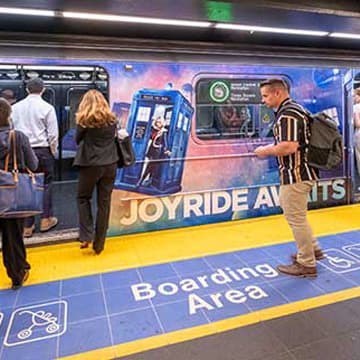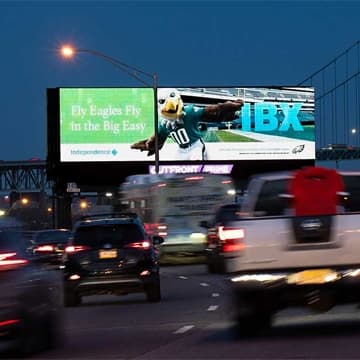
Black@ Took a Global View at The Bigger Picture During the United Nations General Assembly
October 17, 2025While the United Nations’ General Assembly was happening a few blocks away in Turtle Bay last month, an entirely different sort of assembly was happening at OUTFRONT HQ. That’s because Black@ assembled what may have been its most high-powered day of panels yet at The Bigger Picture XI. The next generation of representation was there, spanning the realms of media, entertainment, tech, and culture, along with icons like Wyclef Jean and Rev. Al Sharpton.
Here’s what we took away from each of the day’s important panels.
The Influence of the Culture, Fashion, and Sports
Clarence “Coodie” Simmons, Founder, Creative Control:
We plan on disrupting the whole storytelling – movie – industry because we're going to take the film and make it an immersive experience…we just can't put it in theaters or do film festivals. We have to do something different. We’re looking to partner with brands to do like – at the end of our immersive experience, you watch the movie and then you walk through what you just watched. And in the end, you go through a gift shop, and you get exclusive items and I think that'll draw the kids to come… so when you look at that and you are going to create this experience, what matters most to you? What do you want someone to take away from this?
Aloysius Anagonye, Founder, CEO-ACAN International
Being able to see somebody like yourself is really important because then you have that can-do attitude. Obviously that's important when you looking out in the world, you don't just see somebody, but somebody who kind of really has your story. Not everybody came from the same place. Everybody didn't come from two-parent families, everybody didn't come from a single family. So having a mix of different type of players is really important.
Alex Frias, CMO, Steve Madden:
We actually feature up-and-coming designers, feature and tell their stories and help them sell their product…it's still tied to what we're in the business of that we could add value. So like now this feels like we're actually doing something, that we're telling a story, we're actually showcasing coming somebody that needs the exposure and helping them actually take to the next level…that's how they approach it, right? It's not just a one-time thing. It's not like, oh, it's June, I guess we have to do Pride now. That doesn't work.
Bright Side of Life: How Brands Support Events
Islam Eldessouk, Global Vice President Creative Strategy & Content, Coca-Cola:
It’s a simple fact that you got to move on from exposure to experience. It's memorable experiences. Everything is an experience. Everything communicates, everything connects, everything creates an impression. And if you think of consumers as communities…The minute we start blurting these lines and believe that everything communicates, everything is an experience. So you design just experiences and remove a lot of the definitions, makes it simpler and makes it better. It makes it more human. And then you start creating a lot of engagement.
Malcolm Ellis, Head of Luxury Crown Royal
Campaigns are typically one-size-fits-all across the country. And I was just having this discussion earlier today that the U.S. is really 12 different distinct countries, right? Even Texas, Texas is like 3 countries. Dallas is not Austin and Austin is not San Antonio, right? So things have to be extremely hyperlocal. As I gave the example around rodeo for Houston. Well, that may resonate very well in certain parts of Texas, but that doesn't resonate in Austin. So you don't do a rodeo in Austin. So I think brands have to understand, yes, you can have a national campaign around the brand's identity, but then you have to tweak it to the hyperlocal nuance of the market that you're trying to reach.
Josh Wilson, Founder and Managing Director, Global Venture Partners:
I don't think being joyful, optimistic is an antithesis of being authentic. And I think that can be exacerbated positively during a campaign as well. I keep mentioning authenticity like it's a broken wheel, but I think it's really, really key for that to be able to filter in, in a way that makes sense. So if you can structure a campaign, you know, with us or whoever it may be, is, is that you're partnering with or a creator in a way that does promote those positive values. Those are human emotions that people really resonate towards.
Jeffrey Osuji, CEO, Eventnoire, Partner, Mdnewsline
If you look at my Instagram, that's my system of influence… given that I have shared values with all of these people in a certain capacity, I get immediately influenced. I'm like, if they're doing this, I want to do that because I connect with these people. So similarly, as a brand, if you have certain values, look at the partners that have shared values with you.
Tech, Investment, & the Future
Tony Effik, Managing Director (Global Display, Video, & Creative), Google
I would say the most disruptive thing is going to be, how are we going to work with AI? How are we going to work? You know, what are going to be the sequences, what are going to be the protocols?...It's really interesting to see how people are going to be working with machines in different ways and just be frank about it. The average airline pilot has been doing this for a long time already. We've had autopilot for a long time, where pilots only actually today fly a plane for maybe 20 or 30 minutes of the whole flight…takeoff and landing, and the rest of it is how they use the autopilot.
Oury Tamboura, VP, Global Brands and Advertising, Citi Bank
When I was on the agency side, it’s all about the ROI, like how is your investment, what is your return on investment and how little can you spend to reach the right customers. So the technology is actually allowing us to reach those customers more efficiently…Another way is on the creative side…the one thing where we were seen lacking is optimizing those creative and AI is one of the areas where I'm excited to see how we can do that in real time. Like when we have a TV campaign that's out there, we have to wait six weeks to see how the campaign performed before we can generally test it in the market and get some insight from that before we go and then optimize the creative and then put it back.
Charles Alade, Co-Founder & CEO of Maskvrade
The future is clear for us because that's kind of actually the future of when it comes to how to brands, government entities and even all our key stakeholders are able to understand humans, not from a cosmic perspective, but from our perspective. So we are trying to change the fact that businesses and brands need to move them away from psychographics and demographics. We are trying to move them into human truths because data has been commoditized and we feel that data does not even have any meaning anymore.
America & the Future of Us: No One Is Coming But Us
Al Sharpton, Activist & TV Talk Show Host:
Don't be where you're not reachable. One of the things that I've tried to do is make sure that as we build National Action Network, that will remain accountable. I started it 34 years ago. Every Saturday we have rallies in Harlem at our headquarters over to the public, live on Black radio to this day. When I got the show on MSNBC 14 years ago, they said, oh, he ain't coming Uptown. Been there every Saturday….because if you cannot be accountable to people, how you going to speak for people and how do you lead people you don't even like? Because a lot of us don't even talk to each other.
Brand Engagement, the Media, and the Community
Christen Rocon, Ad Partnerships Director, NBC Universal
I think talking about performance of allyship and actually looking at who's still who stayed around investing in our communities. We can always talk about Target, right? I mean, the fact that they rolled back their DEI initiatives and it has affected their business by $12.4 billion…we still haven't gotten a resolve from that…So I think now a lot of brands, a lot of networks, a lot of they're really looking at the fact that the community will speak and they will take action. So we're no longer accepting performance of allyship. Either you're with us or you're not.
Chantel George, CEO & Founder, Sistas In Sales, Co-Founder, Handshake & Code
We are all spending a good portion of our lives consuming media, right? And so when you think of it from the consumer perspective, yes, media outlets, media platforms do have huge influence over how we view the world. And so if we are not seeing ourselves in a positive light, that impacts us, right? Not only us, but any community, right? It's where we see ourselves at.
Ivan Heredia, Former Chief Marketing Officer-National 4-H Council
There could be patterns of the same archetypes. And then it's up to you all to decide that you want to break that chain of repetitive content. I mean, we're sitting here at OUTFRONT Media. I had to take the shuttle train to Grand Central and I saw all of the media that was, you know, surrounding this, the platform station. We are what we see, not just what we eat. We are what we see in this, in the context of this conversation. You know, media is a mirror. It's a like a speakerphone, if you will, or a boombox. I grew up in the 80s, so I'm showing my age a bit there. It's a boombox. And the more you they repeat what we see, the more we feel like that is who we are.
Kerel Cooper, Chief Marketing Officer, Gumgum
Black social media influencers were not getting the same opportunities as their non-Black counterparts. And so we worked with Nielsen to create what we call the Black Creator Report, which essentially looked at Black creators across multiple platforms, comparing them to non-Black creators. And we were able to see that in certain categories, Black creators were driving as much as 10X higher media value than non-Black creators. And we are able to publish that report, get some good press around it. And it actually moved the needles with some agency and brand partners to invest more with Black creators.
Fireside Chat with Wyclef Jean
Wyclef Jean:
You know, I remember at the GRAMMYS, I came out with my Haitian flag…It's just the idea of saying it's a big world and never forget like where you come from because you could bring something to this country, which is important in saying that we move into the space of technology. So one of the things that I'm very excited about now, I ain't going to talk technology where you're like, oh man, another rapper, man, he think he knows something about tech. So let's start off with my actual tech background. So I'm an engineer by a trade. I started at 14 years old. I figured everything out before I even knew what OK, I'm a geek out for the nerds. Like what binaural was and the idea of like using sine waves and everything. I was in the hood building my patch bays. Everyone that loves The Score, I think it's done 30 years ago next year. That was done in my uncle's basement.
DJ OBIE, DJ/Founder, Obie’s House:
Honestly, it's really consistency…it's in your mind how when you're planning, whatever it is, marketing, advertising, whatever it is that you're doing, how far do you see it going? What's the short-term goals? What's the long-term goals? Is it worth your time? If it's worth your time, are you going to give it 100%? Are you going to give it 1000%? You know, are you going to show up for it every day? Are you going to be there when it's really boring and it's just you?... It's perseverance, it's understanding consistency. When it's not comfortable, it's not always going to be soft. It's not always going to be rosy.
Creativity & Women Across the Globe: Protecting Rights, Powering Innovation
Linda Nosegbe, Director Of Economic Mobility At Gilbert Family Foundation
I think one of the biggest [barriers to funding], and not just women, even when you talk, when you take it a little bit step further underserved populations, I would definitely say access to capital, but not just capital, but also network. Who are the individuals in those spaces of what you're doing looks like you?...mentorship is another big thing as well that a lot of women, especially underserved women, face in that space…So these set ideas about whether women can bring the profits, even though there's a real business case that is strong that when you put women in leadership, businesses thrive.
Sthu Zungu Noel, Private Sector Partnerships Development/United Nations Women
I think one of the barriers to funding actually starts at home. Women creatives are caretakers. They're home builders. While the men are taking care of their creativity, the women also have to take care of the people at home while they try to be extraordinary creatives. And so one of the things we talk about a lot in our work at UN Foundation is that unpaid care that you do. And so if you're so busy taking care of everybody else and still trying to build a platform as a creative, obviously you're never going to get the kind of visibility that you need that unlocks the access to funding. And so I think we also need to think about the policies that make women feel supported in that obligation that they feel to care.
Dan Thomas, Chief Communications Officer, United Nations Global Compact
We feel at the UN Global Compact, that corporate social responsibility is really an old-fashioned term. We're trying to build, incorporate sustainability and sustainable principles, including women's economic empowerment principles, gender equality into the business, into the heart of the business, the strategies of the business, because it makes sense and because it's more profitable. We can prove that companies that are sustainable attract more investment, they attract better talent to come and work for them, their customers like it and willing to support them.
Sueann Tannis, Associate Vice President, Global Communications/ United Nations Foundation
I think when women lead the way, essentially you've got women looking out for other women. So what does the future of creativity look like when we've got women leading and looking out for other women? Well, first of all, we get paid. There is this report that Sue's team put out called Investing in Inclusive Advertising, and there's a line in there that resonated so deeply with me. It says inclusion equals income. Inclusion equals income for the businesses who invest in inclusion, and it equals income for the people on the other side who are being included.
Beyond Borders: Creative Expression Across the Diaspora
Abdul Karim Abdullah, Founder & Chief Executive Officer of Culture Management Group (CMG)
The reality for Black people is that we're not a monolith. We speak completely different languages, we have different experiences, and the distortions or the lack of storytelling that exists allow, do not allow us to be able to have a very good understanding of each other. So the spaces that we create around our festival as places that allow for us to find commonality, find areas of shared experiences, share joy, shared heritage, and, and that's what we hope to be able to do with the spaces that we create, whether it's around food, whether it's around art, around fashion, and definitely around music.
Chika Uwazie, Co-Founder, Afropolitan
People don't know that quietly across West Africa specifically, the biggest Nollywood movies are happening right there on YouTube, right? And they are probably spending a couple $1000 to produce and they're getting easily 20 to $30,000 a month, right? They drop a video and literally they're getting millions of views that day, right? And there's been many viral Nollywood movies all based off of YouTube. And a lot of that money they're getting is from the diaspora watching.
Sola Oke, Managing Director at Pernod Ricard Africa
How do we structure those collaborations so they're sustainable? So they're not just one-off cultural moments in time…in partnerships and collaborations, it's thinking long term. A lot of the times brands we're looking for the ROI. If my P&L is not adding up, I don't want to do it. But what that means is you don't have enough time to sustain that partnership. You don't have enough time for the partnership to be impactful…a lot of brands have partnerships with influencers, but what we do differently is the longer term. The impact of that partnership is not doing a partnership for six months and then you walk away…the consumer hasn't even had time to understand why you have that partnership.
Author: Jay Fenster, Marketing Manager @ OUTFRONT
Links to third-party content are not endorsed by OUTFRONT Media. Past performance may not be indicative of future results. OUTFRONT does not guarantee specific results or outcomes.
Relevant OOH Content Straight To Your Inbox
Essential out of home insights, trends, and success stories. Delivered weekly.



